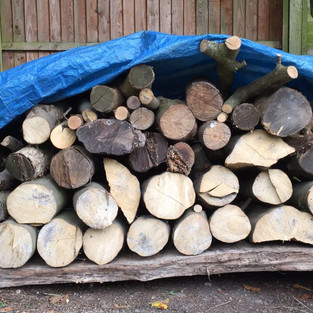How To Avoid Chimney Fires
- Home-Sweep Blogger

- Apr 23, 2020
- 2 min read
Updated: Dec 7, 2020
Chimney fires occur when deposits of carbon and debris accumulate in a chimney and are set alight by sparks or flames from a heat source. The National Safety Council recommends that chimneys be swept thoroughly at least twice a year. Especially after a period of non-usage, it is important to have your chimney swept to prevent the occurrence of a chimney fire.
Our Tips to Avoid Chimney Fires
1. Regular Sweeping and Cleaning
Chimney fires are caused when carbon and debris, such as soot or birds nests, accumulate in the chimney. Therefore, the best way to avoid a chimney fire is to keep your chimney clean. It is recommended that a chimney is swept thoroughly by an approved Chimney Sweep at least twice a year, however depending on the frequency of use you may want to have it swept more regularly. During the COVID-19 lockdown we've seen an increase in the use of stoves, and unfortunately, in preventable chimney fires.
Fire Services all over the country are warning homeowners to get their chimneys swept by an approved sweep to prevent chimney damage and household fires and calling on improved chimney fire safety awareness following recent incidents. If you haven't had your chimney swept in a while please do not delay having your chimney swept. As an essential service, chimney sweeps are able to provide their services during lockdown. Please don't be nervous about contact, at Home-Sweep, we are taking increased safety and sanitization measures to ensure customer safety. You can learn more about our increased safety measures here.
2. Use of Appropriate Fuels
Using the right firewood will increase your heat output, increase burning time, and prevent unnecessary damage to your wood stove. Using the wrong wood may result in excessive build-up in the flue and chimney, which can lead to a chimney fire. It can also reduce performance and result in slow starting, smokey, and short fires, low heat output, dirty glass and unplesant smells.
We use a mixture of 12-18 month seasoned birch and beach logs, all with a moisture content of less that 20%. We find these types of logs generally burn hotter, and for longer. Read more about the different types of wood you can use on our blog post, What Firewood Should I Use?
The Impact of a Chimney Fire
A chimney fire can cause serious damage to the flue, or indeed the building. When damage is caused to the flue or to the property, insurance companies will require details about the sweeping regime, specifically how often the chimney was swept and who had swept it; the sweep should be an Approved Sweep to indicate a level of competency.
In circumstances where an approved sweep has not been used, and/or a regular sweeping regime has not been undertaken, insurance companies may either refuse to pay for any loss or damage incurred as a result of the fire, or reduce their offer.
If at any time smoke or fumes are apparent or suspected to be escaping from the appliance or chimney, stop using the appliance at once and get advice immediately from the installer or a suitably qualified Chimney Sweep. Do not use the appliance or burn any fuel until the installation has been checked. Home-Sweep is a HETAS approved chimney sweep, and with specialist equipment, Home-Sweep can sweep all types of chimneys, flues and liners by brush and vacuum.
















Comments